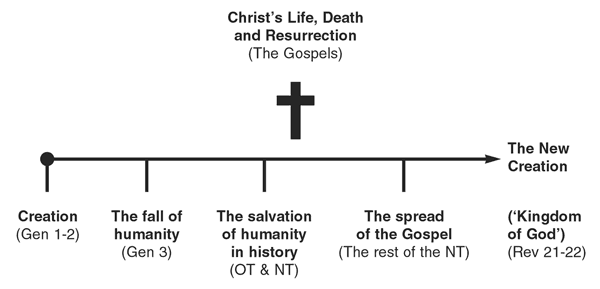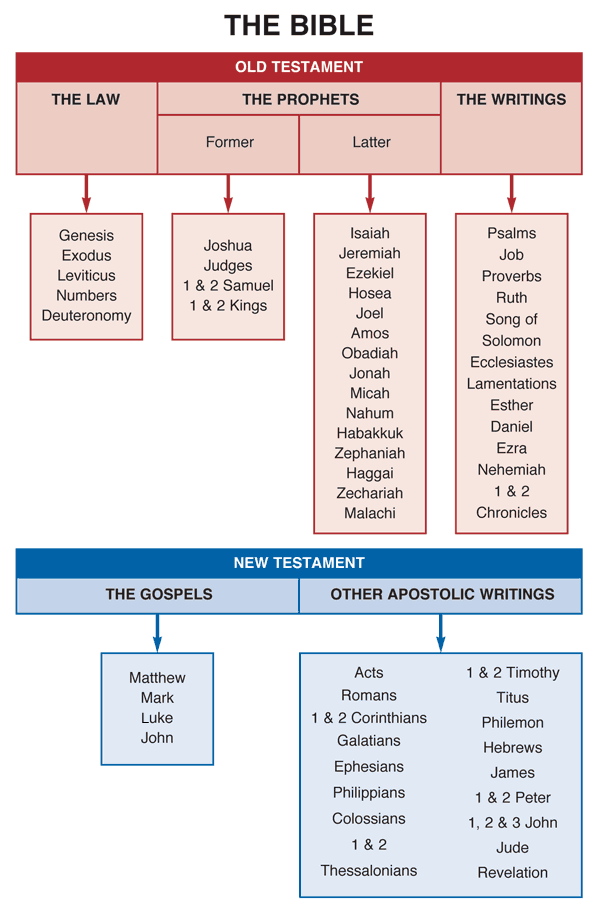Notes: The Book of Books
Study 1 - The Book of Books
In some countries today the Bible is either prohibited or greatly restricted in its circulation. In other countries, where the Bible is readily available, its teachings are often ridiculed, contradicted or ignored. Yet the Bible continues to be the world's best selling book! Why are so many people still keen to purchase and read this ancient book? What is its appeal and what is its relevance to our contemporary situation?
Before you begin...
A friend asks you 'What is your favourite book of the Bible'? You tell them what it is and why. You say...
1. What is the Bible?

Open your Bible at the Table of Contents and you will discover that it is in fact a library of books - thirty-nine in the Old Testament and twenty-seven in the New Testament. Take a closer look and you will see that these books reveal a wide variety of literary material: narratives, laws, ritual instructions, poetry, songs, sermons, prophecies, wisdom sayings, parables, letters and genealogies. If the earliest books date from the time of Moses (15th century bc) and the latest from the close of the 1st century ad, we are dealing with material published, collected and brought together over a period of approximately 1,600 years. Bible scholars do not believe that the books were necessarily written in the order in which we have them in our Bible today, though there is definite logic in the way they have been assembled. Despite the fact that the biblical books were written over such a long period of time, by so many different authors, there is an amazing development of common themes and an overall unity.
2. What is the Bible's message?
Looking at the various sections of the Bible in broad overview, it is possible to perceive the gradual unfolding of the good plan or purpose of God that unifies the whole. The Bible is all about God's gracious actions to reverse the effects of human sin and establish a new creation. Another way of describing this process is to talk about the establishment of 'the Kingdom of God'. This plan of salvation comes to its climax and fulfilment with the ministry of Jesus Christ.
We may conveniently represent the Bible's message at this point with a simple graph:

Later studies will show how this simplification can be expanded to more fully reveal the marvellous plan of the God of grace.
3. What are the main divisions in the Bible?
The most obvious division is between the Old Testament and the New Testament. One of the aims of this study is to explore the relationship between these two parts of the Bible. However, note how these two main sections can be further divided.
3.1 The Old Testament
In our English Bible, the books of the Old Testament are arranged in the following way:
| HISTORICAL BOOKS | MIXED POETRY | PROPHETIC BOOKS |
|---|---|---|
| Genesis to Esther | Job to Song of Solomon | Isaiah to Malachi |
This simple arrangement follows the order of the Greek translation of the Old Testament called the Septuagint. This translation was made from the original Hebrew, beginning in the 3rd century BC.
The Hebrew Bible has the books in a different order. We will look in more detail at that order and follow it in these notes. It is especially helpful as a way of showing the meaning of the various parts of the Old Testament and the way they relate to one another.
There are three main sections in the Hebrew Bible, the second of which has two parts. The following diagram shows these divisions:
| THE LAW | THE PROPHETS | THE WRITINGS | |
|---|---|---|---|
| Former | Latter | ||
| THE LAW |
|---|
| Genesis Exodus Leviticus Numbers Deuteronomy |
The first five books were called by the Jews 'The Law' and by others 'The Pentateuch', (from two Greek words meaning 'five Scrolls'). By 'The Law' (Hebrew torah), the Jews meant more than commands and rules. They understood that this part of scripture gave God's basic teaching by which the rest of the Bible was to be understood. That basic teaching can be seen in the following brief summary.
The Bible begins with an account of the creation of all things by God, the rebellion of humanity against God and the effects of that sin in our world. In order to undo the effects of human sin and bring blessing to all the nations of the world, God called Abraham and his descendants to live in a special relationship with himself. Later, because of that special relationship God saved his people (the exodus of the Jews from Egypt under Moses) and taught them (the giving of various commands to Israel so that they might be a 'holy nation'). God then led his people towards the land of Canaan which he had promised would be theirs.
| THE FORMER PROPHETS |
|---|
| Joshua Judges 1 & 2 Samuel 1 & 2 Kings |
These books were called 'The Former Prophets' by the Jews because they do not simply record the bare facts but they present the history of the period from God's point of view. They also illustrate the importance of prophets - those who speak God's word - in the outworking of God's plan for Israel.
Joshua and Judges describe the conquest of the land of Canaan by Israel, in fulfilment of God's promises. This history of Israel is continued in 1 and 2 Samuel, where it is shown how God's rule over his people is to be forever linked to kings descended from David (see especially 2 Sam 7:12-16). Nevertheless, the books of 1 and 2 Kings show the rebellion of ten of the tribes against the 'house' of David and the establishment of a rival kingdom in the north of the country. The judgement of God eventually falls on those tribes when they are conquered by the Assyrians in 722 BC and exiled from their land.
Even the southern tribes, who remained loyal to the house of David, end up being exiled to Babylon in various stages from 597 BC because of their continual rebellion against God and his purposes for them (see especially 2 Kings 24-25). Thus began a long period when the Israelites lived as refugees, with no land of their own, no king and no temple. Clearly, they began to wonder whether the good purposes of God had been thwarted by their own wickedness.
| THE LATTER PROPHETS |
|---|
| Isaiah Jeremiah Ezekiel Hosea Joel Amos Obadiah Jonah Micah Nahum Habakkuk Zephaniah Haggai Zechariah Malachi |
The Jews called the next section of the Hebrew Bible 'The Latter Prophets'. The prophets whose teaching is recorded in these books deal with the period immediately before, during or after the captivity of the northern and southern kingdoms. Their first task is to make clear the reason for God's terrible judgement on Israel and then to reveal God's plans for the future of his people.
These prophets make it clear that God's gracious purposes have not failed or been abandoned - despite the appearances to the contrary! God will rescue his people from exile and restore them to the promised land in another act of salvation like the exodus from Egypt. The re-establishment of the people is associated with the sending of a king from the line of David (later he became known as the 'Messiah'), who will rule God's people in perfect righteousness. He will bring peace and salvation by establishing what the Jews came to describe as 'the kingdom of God'. This will mean blessing for the whole creation, since God will create 'new heavens and a new earth' (Isa 65:17-25), restoring the harmony of the Garden of Eden, and drawing men and women from every nation to Israel to share in the benefits of knowing the true and living God (Isa 2:1-4). The prophets like Haggai, Zechariah and Malachi, who come after the Babylonian Exile, have the task of encouraging the people to believe that God's plans are in the process of being fulfilled, although the climax is yet to come.
| THE WRITINGS |
|---|
| Psalms Job Proverbs Ruth Song of Solomon Ecclesiastes Lamentations Esther Daniel Ezra Nehemiah 1 & 2 Chronicles |
At first glance, it appears that the Hebrew Bible has placed in this concluding section of the Old Testament a strange collection of books! However, the material falls basically into two categories.
The so-called 'Wisdom Literature' (Job, Proverbs, Ecclesiastes, some of the Psalms and Song of Solomon) focuses on a wide variety of issues, including suffering and death, friendship, love and marriage, loyalty and wisdom. Of all the sections of the Old Testament this part is least tied to the specific culture and historical circumstances of Ancient Israel. The wisdom literature deals with problems of universal significance for men and women in every age and situation. The Psalms contain a whole range of responses to God in prayer and praise, poetry and song, dating from many different periods of the history of Israel.
The rest of 'The Writings' deal basically with the period of the Babylonian Exile and beyond. 1 and 2 Chronicles retrace the history of Israel from the time of David and conclude with the promise that the Lord will restore his people after the Babylonian Exile. The book of Daniel reveals God's plans for Israel and the nations after the Exile. Ezra and Nehemiah portray something of the situation of a relatively small number of Israelites who were restored to their land and sought to rebuild Jerusalem, waiting for the proper fulfilment of God's promises.
3.2 The New Testament
The writers of the New Testament claim that the purposes of God revealed in the Old Testament came to completion in the person and work of the Lord Jesus Christ. The New Testament documents can be divided into two main groups: the Gospels and Other Apostolic Writings.
| THE GOSPELS |
|---|
| Matthew Mark Luke John |
The 'gospel' or proclamation of the significance of Jesus' life, death and resurrection, comes to us in a fourfold form. The witness of Matthew, Mark, Luke and John together gives us a complete picture of the one who is Son of David, Son of God, Saviour and Lord of Israel and the nations. With the coming of Jesus, 'The time has come ... The kingdom of God is near' (Mk 1:14-15). The Gospel writers are particularly concerned to show that Jesus' life at every point fulfils the Old Testament Scriptures.
The focus of each Gospel is on the events surrounding Jesus' death and resurrection, for it was in these events that Jesus supremely fulfilled God's purposes. Jesus himself opened the minds of his disciples to understand that it was written in the Old Testament that 'the Christ must suffer and rise from the dead on the third day, and repentance and forgiveness of sins must be preached in his name to all nations, beginning at Jerusalem' (Lk 24:45-47).
| OTHER APOSTOLIC WRITINGS |
|---|
| Acts Romans 1 & 2 Corinthians Galatians Ephesians Philippians Colossians 1 & 2 Thessalonians 1 & 2 Timothy Titus Philemon Hebrews James 1 & 2 Peter 1, 2 & 3 John Jude Revelation |
The 'Acts of the Apostles' is a companion volume to Luke's Gospel and shows how the message about Christ and his work was taken by the apostles and other early Christians beyond the borders of Israel to the world at large. Acts forms a helpful bridge to the other apostolic writings because it not only tells us something of the way in which Christianity spread, but it also shows us how the ministry of Jesus was understood and proclaimed from the beginning.
The letters of Paul and the other writers deal with practical and doctrinal problems facing the early churches. They give us further valuable insight into the significance of Jesus' life, death, resurrection and ascension. Taking their cue from the teaching of Jesus, they show how the promises of the Old Testament have been, or are being fulfilled. However, they also stress that there is more to come. Once it is clear who Jesus is, then it becomes just as clear that the one who rose from the dead to sit at God's right hand will return in power and glory to wind up this world order and usher in the new heavens and the new earth and the judgement of God. That day will be a great day of redemption and reunion for his people. The Revelation of John brings the New Testament to a close with a focus on the glorified Jesus. It reveals the implications of his death, resurrection and exaltation for the future. It encourages Christians to keep living for Jesus as they await the great day of his return.

4. What does the Bible claim about itself?
Research
Read Jeremiah 1:1-12 and answer these questions:
- Why did God call Jeremiah to be a prophet?
- Why was Jeremiah able to speak with authority?
- How did Jeremiah know that his words would come true?
Time and time again, we read in the Old Testament of the prophets being addressed by God. They claim to be his spokesmen, especially chosen to reveal his will and purpose (compare Ex 5:1-3, 19:1-8; 1 Kgs 17:1-6). Time and time again, we read of mighty acts of God confirming and fulfilling promises made through the prophets, (e.g. Ex 14:13-31; Josh 21:43-45). The prophets expect that the Lord's words in a written form will continue to challenge and encourage his people (e.g. Deut 31:9-13; Jer 36:1-8).
It is important to note that Jesus and his apostles held the view that the Old Testament was inspired by God (e.g. Matt 22:43-44; 2 Tim 3:16-17). Although they acknowledge the role of the human authors, they assert that what was written there was spoken by God (e.g. Matt 22:31-32), since 'men spoke from God as they were carried along by the Holy Spirit' (2 Pet 1:21). Jesus says that 'Scripture cannot be broken' (Jn 10:35, compare Matt 5:17-18) and regularly uses the Old Testament as his authority in controversy with his opponents (e.g. Matt 12:3-4, 5, 7; 21:16, 42) or in teaching about himself and his ministry (e.g. Lk 24:27, 44-47). Each of the New Testament writers follows Jesus' example in recognising the divine inspiration and authority of the Old Testament.
Given such a high view of the Old Testament Scriptures, it is significant that Christians soon recognised the same authority in the writings of the New Testament (e.g. 2 Peter 3:15-16 classifies Paul's writings along with 'the other Scriptures'). The question of why those books came to be added to the books of the Old Testament and recognised as inspired Scripture will be dealt with in Doctrine 1. The apostles themselves were promised by Jesus that the Holy Spirit would especially guide them to remember all that he had said to them (Jn 14:25-26) and to understand further the implications of his ministry (Jn 16:12-15; compare 2:22; 12:16). Clearly, the direction and leading of the Holy Spirit must be considered as the key factor in the writing of the New Testament and the collection of those books together with the prophetic scriptures of the Old Testament to form one Bible.
Even the brief survey of the Bible's contents presented above should help us to appreciate the authenticity of the claim that the various books of our Bible truly reveal the character and will of God and, despite their diversity, they obtain their amazing unity from the fact that they are inspired by God. It should be obvious, therefore, that the Bible has a unique authority. As the 'living and active' word of God (Heb 4:12), Scripture is God's chosen means of revealing his character and will to his people in every age. It must be allowed to stand above church traditions and individual philosophies, teaching, rebuking, correcting and training us in God's ways (2 Tim 3:16-17).
Exercise
- Carefully re-read the section of this study summarising the Old Testament. Why did God continue to deal with the Israelites when they proved to be so unfaithful?
- Carefully re-read the section of this study on the Bible's claim about itself. In what ways is the Bible a unique book?
- Read the article 'Bible' in the New Bible Dictionary (NBD) and note down anything extra that is relevant for Study 1. If your interest for extra research is still strong, read 'Canon of the Old Testament' and 'Canon of the New Testament'.
Reflection
Which parts of the Bible do you feel very familiar with? Which parts seem totally foreign? Why not plan to read the parts of the Bible that seem totally foreign to you.
Create a plan to work through the parts of the Bible you are unfamiliar with.
Where to learn more
Understanding the character and purpose of the Bible is really vital to our Christian growth. The Doctrine 1 subject unit will further explore the nature of the Bible in the light of the gospel of Christ.
